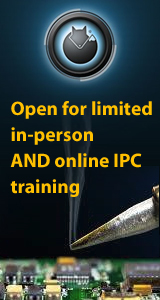BANNOCKBURN, IL - Industry experts will shine the spotlight on recent revisions to key electronics manufacturing industry standards and guidelines during IPC’s professional development program at Electronics Midwest. On September 27 and September 29–30, half-day, in-depth workshops will address major updates to the standards that establish electronics manufacturing requirements and acceptability criteria worldwide. In addition, a workshop covering industry best practices, new and emerging developments and future trends in materials and processes for packaging and assembly will be offered.
“These workshops offer a great opportunity for attendees to learn about the standards they use or specify regularly and how to maximize operational efficiencies,” says Dave Torp, IPC vice president of standards & technology. “As an added bonus, every workshop attendee will receive a copy of the corresponding standard(s).”
On September 27, C. Don Dupriest of Lockheed Martin Missiles and Fire Control will present, “What’s New in IPC-A-600H and IPC-6012C.” Dupriest will discuss the revisions to IPC-6012C, Qualification and Performance Specification for Rigid Printed Boards, and its companion document, IPC-A-600H, Acceptability of Printed Boards. He will review the new specifications and provide attendees with a thorough understanding of the processes, materials and engineering requirements impacted by the revisions.
In “IPC-7351B Land Pattern: Reliable Footprint and Land Pattern Configuration in a Lead-Free Environment,” on September 29, instructors Dieter Bergman, IPC director of technology transfer, and Tom Hausherr, EDA library product manager for Mentor Graphics Corporation, will help attendees get up to date on advances in surface mount land pattern design.
On September 30, the revisions to two key industry standards, J-STD-001, Requirements for Soldered Electrical and Electronic Assemblies, and IPC-A-610, Acceptability of Electronic Assemblies, will be reviewed. The morning workshop, “What’s New in IPC J-STD-001E?” will cover the requirement changes necessitated by evolving solder technology. Recognized worldwide as the sole industry-consensus standard for soldering processes and materials, J-STD-001 encompasses advanced technologies and provides new and updated criteria for all three classes of construction, as well as expanded support for lead-free manufacturing. The workshop will be taught by the leaders of the IPC J-STD-001 Task Group.
In the afternoon, the co-chair of the IPC-A-610 Task Group will provide an overview of the application and impact of the new requirements of IPC’s most widely-used standard in “What’s New in IPC-A-610E?” Relevant for anyone responsible for the acceptability of printed circuit assemblies, the session will review criteria for surface mount, soldering connection, wetting, depanelization, flex, mechanical assembly, intrusive soldering and lead-free.
In addition to workshops on standards’ updates, “Packaging and Assembly in the New Decade — Materials and Processes,” will be presented by Jennie Hwang, Ph.D., H-Technologies Group Inc., on September 29. The session will highlight new and emerging developments in solder materials, bare board, modular process and techniques of lead-free and tin-lead assemblies.
For more information on the IPC professional development workshops at Electronics Midwest or to register, visit http://www.ElectronicsMidwest.com. Early-bird savings of 20 percent off of registration fees is available for registrants through August 27, 2010. Special registration packages and other options can be viewed at http://www.ElectronicsMidwest.com/reg-options.
IPC (www.IPC.org) is a global trade association based in Bannockburn, Ill., dedicated to the competitive excellence and financial success of its 2,700 member companies which represent all facets of the electronics industry, including design, printed board manufacturing, electronics assembly and test. As a member-driven organization and leading source for industry standards, training, market research and public policy advocacy, IPC supports programs to meet the needs of an estimated $1.7 trillion global electronics industry. IPC maintains additional offices in Taos, N.M.; Arlington, Va.; Garden Grove, Calif.; Stockholm, Sweden; Moscow, Russia; and Shanghai, Shenzhen and Beijing, China.

 »
»





